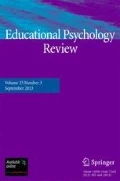Abstract
The expertise literature within cognitive science has provided a rich series of ideas which can be used to improve applied practice. The authors of the articles in this special issue have taken many of these ideas and made useful elaborations and extensions. In reaction to the articles, we suggest five blocks to a full utilization of the expertise literature and other constructs in practitioner development. These blocks are: (a) the need to go beyond the cognitive realm to the working alliance for the fundamental construct in the domain; (b) the need to realize that the novice-to-expert path takes a long time—perhaps 15 years—to travel; (c) the inappropriate use of a short experience differential in comparative studies of novices and experts; (d) the importance of reflection for development; and (e) the need for professors, in order to be experts, to also be practitioners in the domain.
Similar content being viewed by others
REFERENCES
Chi, M. T. H., Glaser, R., and Farr, M. J. (eds.) (1988). The Nature of Expertise, Erlbaum, Hillsdale, NJ.
Cowle, R. (1996). The Therapeutic Alliance and Its Relationship with Psychotherapy Outcome. Unpublished manuscript, University of Minnesota, Minneapolis.
Dawes, R. M. (1994). House of Cards: Psychology and Psychotherapy Built on Myth, The Free Press, New York.
Ericsson, K. A., Krampe, R. T., and Tesch-Romer, C. (1993). The role of deliberate practice in the acquisition of expert performance. Psychol. Rev. 100: 363–406.
Goodyear, R. K. (1997). Psychological expertise and the role of individual differences: An exploration of issues. Educ. Psychol. Rev. 9: 251–265.
Harrington, K. (1988). Personal Characteristics of Diplomates Defined as Master Therapists. Unpublished doctoral dissertation, University of Minnesota, Minneapolis.
Hogan, R. A. (1964). Issues and approaches in supervision. Psychother. Theory Res. Pract. 1: 139–141.
Horvath, A. O., and Greenberg, L. S. (eds.) (1994). The Working Alliance: Theory, Research, and Practice, Wiley, New York.
Jennings, L. (1996). Personal Characteristics of Master Therapists. Unpublished doctoral dissertation, University of Minnesota, Minneapolis.
Jennings, L., and Skovholt, T. M. (1996). The R-C-E Model of Therapist Expertise. Manuscript in preparation, University of Minnesota, Minneapolis.
Kokotovic, A. M., and Tracey, T. J. (1990). Working alliance in the early phase of counseling. J. Counsel. Psychol. 37: 16–21.
Krupnick, J. L., Sotsky, S. M., Simmens, S., Moyer, J., Elkin, I., Watkins, J., and Pilkonis, P. A. (1996). The role of the therapeutic alliance in psychotherapy and pharmacotherapy outcome: Findings in the National Institute of Mental Health Treatment of Depression Collaborative Research Program. J. Consult. Clin. Psychol. 24: 532–539.
Lichtenberg, J. (1997). Expertise in counseling psychology: A concept in search of support. Educ. Psychol. Rev. 9: 221–238.
Locke, T. F., and Covell, A. J. (1997). Characterizing expert psychologist behavior: Implications from selected expertise literature. Educ. Psychol. Rev. 9: 239–249.
Mallinckrodt, B. (1991). Clients' representations of childhood emotional bonds with parents, social support and formation of the working alliance. J. Counsel. Psychol. 38: 401–409.
Neufeldt, S. A., Karno, M. P., and Nelson, M. L. (1996). A qualitative study of experts' conceptualization of supervisee reflectivity. J. Counsel. Psychol. 43: 3–9.
Norcross, J. C., and Freedheim, D. K. (1992). Into the future: Retrospect and prospect in psychotherapy. In Freedheim, K. D. (ed.), History of Psychotherapy: A Century of Change, American Psychological Association, Washington, DC.
O'Byrne, K., Clark, R. E., and Malakuti, R. (1997). Expert and novice performance: Implications for clinical training. Educ. Psychol. Rev. 9: 321–332.
O'Byrne, K. R., and Goodyear, R. K. (1977). Client assessment by novice and expert psychologists: A comparison of strategies. Educ. Psychol. Rev. 9: 267–278.
Piper, W. E., Azim, H. F., Joyce, A. S., McCallum, M., Nixon, G. W. H., and Segal, P. S. (1991). Quality of object relations versus interpersonal functioning as predictors of therapeutic alliance and psychotherapy outcome. J. Nerv. Ment. Dis. 179: 432–438.
Rønnestad, M. H., Orlinsky, D., Parks, B., and Cierpka, M. (June, 1996). Levels of Therapist Development: Temporal and Non-temporal Parameters. Paper presented at the 27th Annual Meeting of the Society of Psychotherapy Research, Amelia Island, FL.
Rønnestad, M. H., and Skovholt, T. M. (1991). Professional development and stagnation of therapists and counselors. Norwegian Psychol. J. 28: 555–567.
Rosenberg, J. (1997). Expertise research and clinical practice: A suicide assessment and intervention training model. Educ. Psychol. Rev. 9: 279–296.
Sakai, P. and Nasserbakht, A., (1997). Cognitive development and cognitive science models of expertise: possible convergences and divergences. Educ. Psychol. Rev. 9: 353–359.
Schoen, D. (1983). The Reflective Practitioner: How Professionals Think in Action, Basic Books, New York.
Sexton, T. L., and Whiston, S. C. (1994). The status of the counseling relationship: An empirical review, theoretical implications, and research directions. Counsel. Psychol. 22(1): 6–78.
Skovholt, T. M., and Rønnestad, M. H. (1995). The Evolving Professional Self: Stages and Themes of Therapist and Counselor Development, Wiley, New York.
Stein, D. M., and Lambert, M. J. (1984). On the relationship between therapist experience and psychotherapy outcome. Clin. Psychol. Rev. 4: 1–16.
Wittmer, J., and Lister, J. (1971). The graduate record exam, 16 PF questionnaire and counselor effectiveness. Counsel. Educ. Supervis. 1: 293.
Author information
Authors and Affiliations
Rights and permissions
About this article
Cite this article
Skovholt, T.M., Rønnestad, M.H. & Jennings, L. Searching for Expertise in Counseling, Psychotherapy, and Professional Psychology. Educational Psychology Review 9, 361–369 (1997). https://doi.org/10.1023/A:1024798723295
Issue Date:
DOI: https://doi.org/10.1023/A:1024798723295



